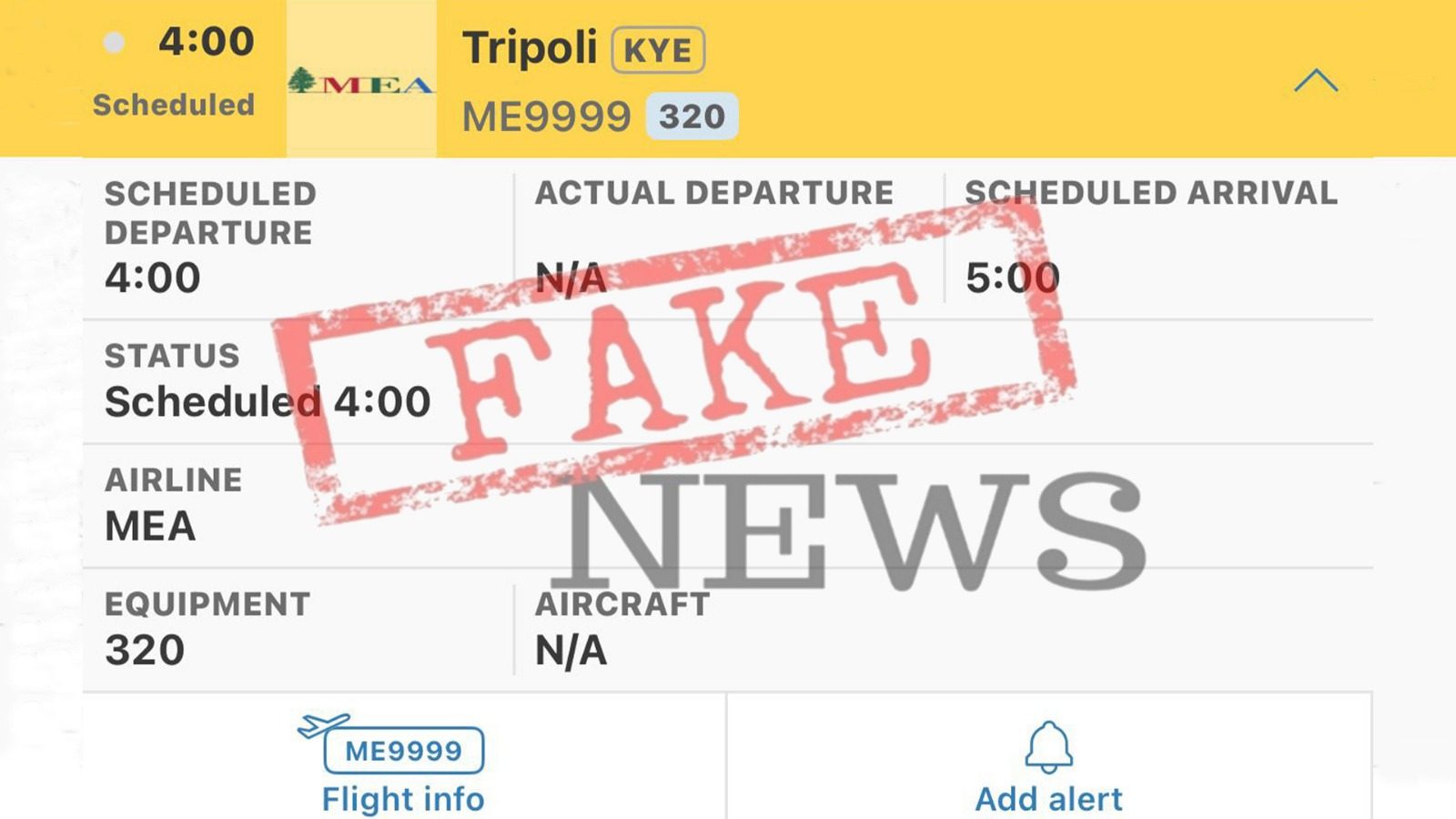A recent claim that Middle East Airlines (MEA), Lebanon’s national carrier, was planning a test flight from Beirut’s Rafic Hariri International Airport to Qlayaaat Airport in northern Lebanon has been thoroughly debunked as false.
The rumor, which spread across social media platforms like X in mid-May 2025, initially gained attention due to heightened public interest in Lebanon’s aviation sector amid regional tensions. However, credible investigations have confirmed that no such test flight was ever scheduled or planned.
The Rumor’s Emergence
The story about an alleged MEA test flight to Qlayaaat Airport first surfaced through unverified social media posts, particularly on X, around mid-May 2025. Qlayaaat Airport, located in the Akkar region, is a small airfield primarily used for military purposes and lacks the infrastructure for commercial passenger flights.
The rumor suggested that MEA was exploring the possibility of testing operations at Qlayaaat, possibly as a contingency plan due to security or operational challenges at Beirut’s main airport.
The claim spread rapidly, fueled by speculation about Lebanon’s aviation challenges and the broader geopolitical context in the Middle East.
Some posts suggested the test flight was linked to concerns about Rafic Hariri International Airport’s operations amid regional tensions, including Israeli accusations of illicit activities at the airport, which Lebanese authorities have consistently denied.
Fact-Checking the Claim
Following the rumor’s spread, several reputable Lebanese media outlets conducted investigations to verify its validity. On May 21, 2025, sources such as L’Orient-Le Jour, MTV Lebanon, and other local news platforms reported that the claim was baseless.
These outlets, known for their reliable coverage of Lebanese affairs, confirmed through inquiries with MEA and aviation authorities that no test flight to Qlayaaat Airport was planned.
L’Orient-Le Jour explicitly stated that neither MEA nor the Lebanese Civil Aviation Authority had issued any statements or documentation supporting the rumor.
MTV Lebanon’s English-language coverage further noted that Qlayaaat Airport’s current infrastructure is unsuitable for commercial flights, lacking essential facilities like passenger terminals or advanced air traffic control systems. Posts on X from accounts like
@LOrientLeJour and @MTVEnglishNews
reiterated these findings, emphasizing the absence of credible evidence.
To ensure accuracy, this article cross-referenced these reports and found no official MEA communications—on their website, social media, or through spokespersons—indicating plans for a test flight to Qlayaaat.
The airline’s focus remains on maintaining operations at Rafic Hariri International Airport, Lebanon’s primary commercial hub.

Addressing Potential Errors
While the original rumor has been consistently debunked, it’s worth noting that misinformation can sometimes arise from misinterpretations of unrelated events. For instance, MEA has occasionally conducted special flights or operational adjustments due to regional circumstances, such as repatriation flights during periods of heightened tension.
However, no evidence suggests any connection to Qlayaaat Airport. The airfield’s limited capacity and military focus make it an impractical choice for commercial operations without significant upgrades, which would require public announcement and investment.
If any specific details in prior reports were misinterpreted, such as confusion with other MEA activities or regional aviation developments, this article aims to clarify that the Qlayaaat test flight claim is entirely unfounded based on current information.
Misinformation’s Impact on Aviation
False reports about flight operations can have serious consequences, including public confusion, operational disruptions, and strained diplomatic relations. The aviation sector in the Middle East is particularly vulnerable to misinformation due to its intersection with geopolitical dynamics.
For example, earlier in 2025, Iran accused Israel of interfering with flights to Beirut, illustrating how aviation-related claims can escalate tensions. The Qlayaaat rumor, while less inflammatory, underscores the need for accurate reporting to maintain public trust.
Social media platforms like X amplify the challenge, as unverified posts can reach wide audiences before fact-checking catches up. This incident highlights the importance of relying on primary sources, such as official airline statements or reputable media, to verify claims.
MEA’s Current Operations
Middle East Airlines has been navigating significant challenges in 2025, including regional security concerns and economic pressures. Despite these, the airline has maintained operations at Rafic Hariri International Airport, serving as Lebanon’s primary gateway. Notable activities include a repatriation flight to Tehran in February 2025 to assist stranded Lebanese nationals, demonstrating MEA’s commitment to supporting its citizens amid regional disruptions.
There is no indication that MEA is exploring operations at secondary airports like Qlayaaat. Any such move would require extensive planning, infrastructure upgrades, and public communication, none of which has been documented.
Conclusion: A Call for Vigilance
The debunked rumor of an MEA test flight to Qlayaaat Airport serves as a case study in the dangers of misinformation, particularly in a sensitive sector like aviation.
Credible investigations by outlets like L’Orient-Le Jour and MTV Lebanon have confirmed the claim’s falsehood, and no evidence supports the idea of such a flight. As Lebanon navigates its challenges, the public is urged to verify information through trusted sources to avoid falling for unverified rumors.
If you have specific concerns about inaccuracies in this or the previous article, please provide details, and I’ll ensure the information is corrected or clarified further. For now, the evidence overwhelmingly supports the conclusion that the Qlayaaat test flight story is fake news, and MEA’s operations remain centered in Beirut.

